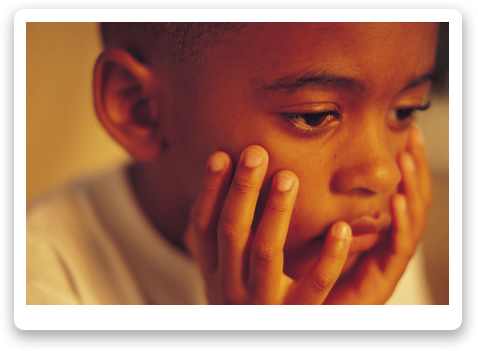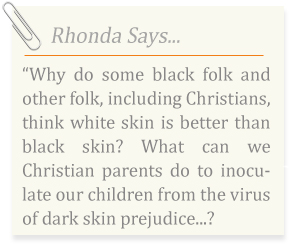


June 6-June 20
| EEWMAGAZINE.COM |
Rhonda J. Smith is a former college speech
instructor & communications coordinator
turned full-time homemaker & journalist. The
writing of this committed wife and mother
who earned her Bachelor’s degree in
journalism and a Master’s degree in
communication from Wayne State University,
Detroit, has been featured in The Detroit
News, Newsday (New York), Chicago
Tribune, Daily Tribune (Royal Oak, MI),
Guideposts, and Charisma Magazine.
Rhonda frequently speaks at ministry
functions, writes and edits newsletters for
Christian ministries, and teaches public
speaking workshops. Three times a week,
she encourages women to lean on God's
strength instead of their own through her
blog, Musings of a (Recovering) Strong Black
Woman. She, her husband and three sons
attend Evangel Ministries in Detroit, where
they live.
Email Rhonda Smith:
rhonda@eewmagazine.com
Connect on Facebook:
Facebook.com
instructor & communications coordinator
turned full-time homemaker & journalist. The
writing of this committed wife and mother
who earned her Bachelor’s degree in
journalism and a Master’s degree in
communication from Wayne State University,
Detroit, has been featured in The Detroit
News, Newsday (New York), Chicago
Tribune, Daily Tribune (Royal Oak, MI),
Guideposts, and Charisma Magazine.
Rhonda frequently speaks at ministry
functions, writes and edits newsletters for
Christian ministries, and teaches public
speaking workshops. Three times a week,
she encourages women to lean on God's
strength instead of their own through her
blog, Musings of a (Recovering) Strong Black
Woman. She, her husband and three sons
attend Evangel Ministries in Detroit, where
they live.
Email Rhonda Smith:
rhonda@eewmagazine.com
Connect on Facebook:
Facebook.com
| ADVERTISEMENT |
| BI-WEEKLY COLUMNS |

EMAIL:
About the Writers
This soon-to-be-released documentary about dark skin prejudice has been the buzz of the
Internet for the last few weeks and with good reason: People want to know why this age-old issue
is still a present-day reality. Why do black folk and other folk, including Christians, think white
skin is better than black skin? What can we Christian parents do to inoculate our children from
the virus of dark skin prejudice that leaves them feeling worthless?
When Joshua said he wanted to be white, at first I didn't have a Godly clue about what to do. I
wanted to rid my house of the virus the way I knew to do. I wanted to buy artifacts from the
African shop, though it is owned and run by a Christian cult; I wanted to saturate my home with
black magazines, though I had to stop subscribing to them because they were taking my time
and feeding my pride; and I wanted to return to my sorority (another source of pride and
idolatry) so Joshua could see upwardly mobile black folks on the regular and not have to
question if black folks were glamorous, rich or significant enough, if he were enough.
From his view, being black was bad because "the white women on the casino commercials wear
fancy clothes, the poor kids in Africa are black and hell is black." He shaped his view from a
commercial, a Christian mission feeding program and Bible study. How was I going to edify him
and redirect his analytical skills? I tried to use Acts 17:24-26, emphasizing that all people come
from the blood of one man so we are all the same. For him, that was a good intellectual argument
but didn't change his heart. He still believed that "the beautiful ladies are white; white just looks
better." The knot in my throat got thicker, rolled and burned, but I was able to swallow and say,
"God made us all and didn't make one race better than another." His hollowed sad stare
continued and I knew my words didn't penetrate. I wanted my words to go surgical deep,
removing the virus from his core, giving him a renewed heart. I finally prayed that God would
help me not to create white racial prejudice in Joshua while trying to combat his feeling of racial
inferiority. I reminded God that I really wanted to put the Kingdom above race and my fleshly
desires, and I begged Him to show me how His word would work for Joshua because nothing
seemed to be working. One morning, about three days into the turmoil, God spoke to my spirit
Proverbs 6:25, a passage I had to look up because I didn't know the reference:
"Lust not after her beauty in thine heart; neither let her take thee with her eyelids." This was
Solomon warning his son not to fall into adultery with a prostitute, "a strange woman," but this
verse was for me to warn Joshua not to fall prey to coveting (the meaning of lust), desiring to
have white flesh, "other flesh," which is another meaning of the phrase "strange woman."
Joshua's root problem was covetousness and that was manifesting as racial hatred, self-hatred.
Covetousness was the real virus; if I didn't tackle that, there would be more hatred, discontent
for whatever God gave him that he deemed less than.
Even before Joshua got saved at 5 he had a great appetite and understanding of the Bible, the 10
Commandments being a favorite of this boy with a strong sense of righteousness. He explained
coveting as this: "It's when God gives you something and you say, 'I know you gave this to me
God, but I really don't want this. I want this instead.'" So I asked him how he had coveted that
week. "I haven't coveted anything this week," he said.
"Yes you have. You have coveted your neighbor's skin color. God gave white people white skin
and gave you black skin. You said you wanted to be white. So you're telling God, 'I know you
gave me black skin, but I don't want black skin. I want white skin.' You have coveted this week."
His eyes got big with understanding, guilt and relief. From that moment, Joshua never again said
he wanted to be white, but whenever he would see something that might make him want to
declare that, he instead said, "From the blood of one man God made everyone. Nobody is better
than anybody" or "That's coveting." He learned to self correct with this issue by using the word
of God because I used the word of God, the only thing powerful enough to know the thoughts
and intents of our hearts (Hebrews 4:12).
What's in our hearts determines what's in our homes and impacts the outside world. Sometimes
what's in our hearts shows up in our homes and in the hearts of our children and remains with
them until they become grown dark girls and boys. We might have our own unresolved dark
skin prejudice issue that comes out in what we say and do, like "I'm staying out of the sun. I
don't need to get no darker" or pinching a child's wide nose and telling them to hold in their lips.
We are teaching our children racial hatred, assigning shame to the beauty God created, and we
are teaching them to covet. And when we suggest that anything God made is not good, we are
teaching them to blaspheme God and His word (Genesis 1:31). The virus then spreads far and
deep, infecting the souls of our children and making our jobs harder to teach them to put the
Kingdom first. But if we examine our hearts and ask God to show us what’s infecting our children’
s hearts, we can address through God’s word anything—even dark skin prejudice—that brings
Him shame.
Did you enjoy Rhonda's column in EEW Magazine. Email her and let her know you were
blessed by what God gave her to share at rhonda@eewmagazine.com!
Internet for the last few weeks and with good reason: People want to know why this age-old issue
is still a present-day reality. Why do black folk and other folk, including Christians, think white
skin is better than black skin? What can we Christian parents do to inoculate our children from
the virus of dark skin prejudice that leaves them feeling worthless?
When Joshua said he wanted to be white, at first I didn't have a Godly clue about what to do. I
wanted to rid my house of the virus the way I knew to do. I wanted to buy artifacts from the
African shop, though it is owned and run by a Christian cult; I wanted to saturate my home with
black magazines, though I had to stop subscribing to them because they were taking my time
and feeding my pride; and I wanted to return to my sorority (another source of pride and
idolatry) so Joshua could see upwardly mobile black folks on the regular and not have to
question if black folks were glamorous, rich or significant enough, if he were enough.
From his view, being black was bad because "the white women on the casino commercials wear
fancy clothes, the poor kids in Africa are black and hell is black." He shaped his view from a
commercial, a Christian mission feeding program and Bible study. How was I going to edify him
and redirect his analytical skills? I tried to use Acts 17:24-26, emphasizing that all people come
from the blood of one man so we are all the same. For him, that was a good intellectual argument
but didn't change his heart. He still believed that "the beautiful ladies are white; white just looks
better." The knot in my throat got thicker, rolled and burned, but I was able to swallow and say,
"God made us all and didn't make one race better than another." His hollowed sad stare
continued and I knew my words didn't penetrate. I wanted my words to go surgical deep,
removing the virus from his core, giving him a renewed heart. I finally prayed that God would
help me not to create white racial prejudice in Joshua while trying to combat his feeling of racial
inferiority. I reminded God that I really wanted to put the Kingdom above race and my fleshly
desires, and I begged Him to show me how His word would work for Joshua because nothing
seemed to be working. One morning, about three days into the turmoil, God spoke to my spirit
Proverbs 6:25, a passage I had to look up because I didn't know the reference:
"Lust not after her beauty in thine heart; neither let her take thee with her eyelids." This was
Solomon warning his son not to fall into adultery with a prostitute, "a strange woman," but this
verse was for me to warn Joshua not to fall prey to coveting (the meaning of lust), desiring to
have white flesh, "other flesh," which is another meaning of the phrase "strange woman."
Joshua's root problem was covetousness and that was manifesting as racial hatred, self-hatred.
Covetousness was the real virus; if I didn't tackle that, there would be more hatred, discontent
for whatever God gave him that he deemed less than.
Even before Joshua got saved at 5 he had a great appetite and understanding of the Bible, the 10
Commandments being a favorite of this boy with a strong sense of righteousness. He explained
coveting as this: "It's when God gives you something and you say, 'I know you gave this to me
God, but I really don't want this. I want this instead.'" So I asked him how he had coveted that
week. "I haven't coveted anything this week," he said.
"Yes you have. You have coveted your neighbor's skin color. God gave white people white skin
and gave you black skin. You said you wanted to be white. So you're telling God, 'I know you
gave me black skin, but I don't want black skin. I want white skin.' You have coveted this week."
His eyes got big with understanding, guilt and relief. From that moment, Joshua never again said
he wanted to be white, but whenever he would see something that might make him want to
declare that, he instead said, "From the blood of one man God made everyone. Nobody is better
than anybody" or "That's coveting." He learned to self correct with this issue by using the word
of God because I used the word of God, the only thing powerful enough to know the thoughts
and intents of our hearts (Hebrews 4:12).
What's in our hearts determines what's in our homes and impacts the outside world. Sometimes
what's in our hearts shows up in our homes and in the hearts of our children and remains with
them until they become grown dark girls and boys. We might have our own unresolved dark
skin prejudice issue that comes out in what we say and do, like "I'm staying out of the sun. I
don't need to get no darker" or pinching a child's wide nose and telling them to hold in their lips.
We are teaching our children racial hatred, assigning shame to the beauty God created, and we
are teaching them to covet. And when we suggest that anything God made is not good, we are
teaching them to blaspheme God and His word (Genesis 1:31). The virus then spreads far and
deep, infecting the souls of our children and making our jobs harder to teach them to put the
Kingdom first. But if we examine our hearts and ask God to show us what’s infecting our children’
s hearts, we can address through God’s word anything—even dark skin prejudice—that brings
Him shame.
Did you enjoy Rhonda's column in EEW Magazine. Email her and let her know you were
blessed by what God gave her to share at rhonda@eewmagazine.com!
I thought the house was clean, walls wiped down and floors scrubbed and shined after crumbs
got cleared from corner crevices, but it seemed I had left some dust dangling, and we were
infected.
"I want to be white," Joshua declared at age 6, revealing that my attempt to present a race
neutral and God is superior home had failed. My heart stopped, body numbed and mind raced
tracing my sanitation process. It seemed though I had removed at God's command the African
masks and printed cloths I bought from the local African shop and incorporated more Christian
themes in my decor to complement my string of bible studies, books and DVDs, my son still
wasn't thinking about the Kingdom first.
got cleared from corner crevices, but it seemed I had left some dust dangling, and we were
infected.
"I want to be white," Joshua declared at age 6, revealing that my attempt to present a race
neutral and God is superior home had failed. My heart stopped, body numbed and mind raced
tracing my sanitation process. It seemed though I had removed at God's command the African
masks and printed cloths I bought from the local African shop and incorporated more Christian
themes in my decor to complement my string of bible studies, books and DVDs, my son still
wasn't thinking about the Kingdom first.
I just couldn't understand how my son with the
Afrocentric mama and little TV watching and
no Michelangelo Jesus pictures gracing the
walls could say he wanted to be white. I couldn't
understand how my love and "beautiful brown
baby boy" language was not enough for him.
This was almost three years ago, and I wasn’t
going to tell you this, you being new to me, not
really knowing me since you just got introduced
to me recently. But the perplexity and pain is
fresh hearing the words of black girls locked in
women's bodies in the preview of Dark Girls.
Afrocentric mama and little TV watching and
no Michelangelo Jesus pictures gracing the
walls could say he wanted to be white. I couldn't
understand how my love and "beautiful brown
baby boy" language was not enough for him.
This was almost three years ago, and I wasn’t
going to tell you this, you being new to me, not
really knowing me since you just got introduced
to me recently. But the perplexity and pain is
fresh hearing the words of black girls locked in
women's bodies in the preview of Dark Girls.

| ADVERTISEMENT |

| Copyright © 2011-2014 EEW Magazine. All rights reserved. Reproduction in whole or in part without permission is prohibited. |
EEW Magazine is the premiere site for African American Christian news, viewpoints, and information. Visit EEWMagazine.com daily to get informed and
get the latest coverage of black news and black entertainment from a Christian perspective.
get the latest coverage of black news and black entertainment from a Christian perspective.





